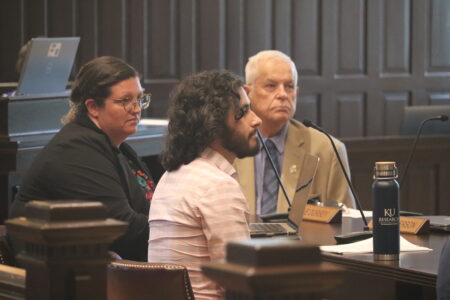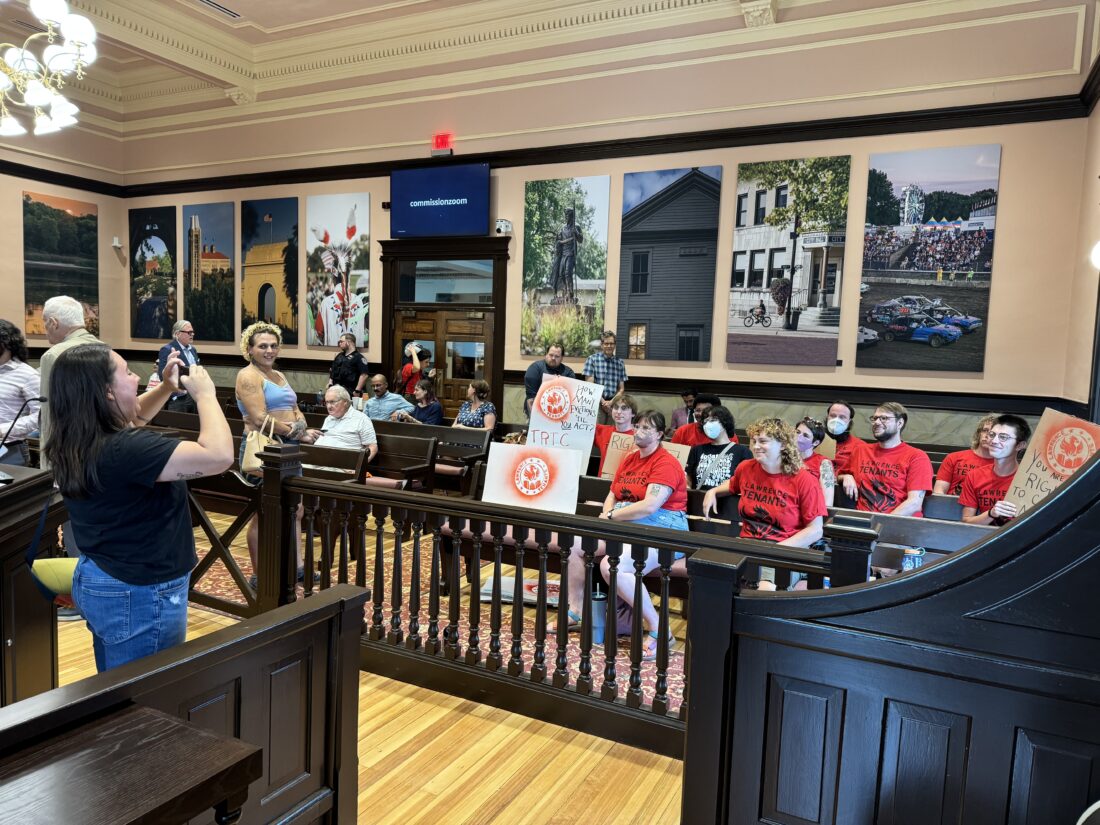Advocates urge Douglas County commissioners to create a tenants’ right to counsel program, but funding questions loom

photo by: Josie Heimsoth/Journal-World
Vince Munoz, a member of Lawrence Tenants, meets with Douglas County commissioners during a work session on Wednesday, September 3, 2025.
Advocates on Wednesday urged Douglas County commissioners to consider a right to counsel program for renters facing eviction, but some commissioners raised concerns about funding and the proposed timeline.
At their weekly meeting, county commissioners heard from representatives of local advocacy group Lawrence Tenants, Kansas Holistic Defenders and the National Coalition for a Civil Right to Counsel about the possibility of creating a tenants’ right to counsel program in Douglas County.
Lawrence Tenants has called on the County Commission to vote by Oct. 1 on an ordinance providing legal assistance to renters facing eviction. The group has proposed an amendment to the Douglas County Code, which would introduce a new article titled “Tenants’ Right to Counsel,” which was shared with commissioners on Wednesday.
According to a memo to commissioners from Lawrence Tenants, a program like this would cover every tenant no matter their income; cover legal proceedings in which a tenant could lose their housing or housing subsidy; provide courtroom representation, legal advice, advocacy and assistance; and require that Douglas County contact nonprofit legal providers to provide tenant legal counsel.
The group said if the ordinance is voted on by Oct. 1, a coordinator for the program could be hired by December and designated legal providers could start providing representation by the end of 2026.
The commission did not take any action on Wednesday on the topic, which was discussed during a work session for informational purposes only. But Commissioner Karen Willey had questions about the timing.
Willey noted that the county passed a budget for 2026 just a week ago, and programs that get funded through Douglas County typically go through the budget process. She said that she would be interested in exploring a cost analysis of a tenants’ right to counsel program along with potential partners.

photo by: Josie Heimsoth/Journal-World
Members of Lawrence Tenants spoke at the Douglas County Commission meeting on Wednesday, September 3, 2025.
“The October 1st idea that an outside group would write something and we would pass it in a short period of time as kind of an unfunded mandate is not something I think fits with how Douglas County has traditionally worked,” Willey said. “I think (it would be) much more important to start digging in as we’re doing and learning pieces that can be impacted.”
Commissioner Shannon Reid said that while there were still some unanswered questions, she didn’t think the county was too far away from the answers. She noted the work that organizations such as Kansas Holistic Defenders have already done to help some people facing eviction, and wondered how it could be scaled up.
“I think a cost analysis is definitely a piece that we don’t have significant information about yet to really be able to grapple with what would funding look like,” Reid said. “… We have active eviction defense happening in the county, and to me, that means we’re at a point in the conversation where it’s about how do we increase that capacity and maximize the potential there?”
After the work session, during the County Commission’s regular meeting, commissioners heard more than an hour of public comments from members of Lawrence Tenants along with community members who supported a program like this.
Gabi Sprague, a member of Lawrence Tenants and the previous human services program manager for Douglas County, said she’s seen evictions filed over as little as $70, for late fees that are unfounded or just because a property owner didn’t like a tenant. She said she thought a month was more than enough time to find consensus with county staff on the language for a code amendment.
“We can see nationally that this is something that saves money,” Sprague said. “I truly don’t understand the hesitancy. And let’s be real, having worked for the county, I know there are situations where things have been funded outside of the budget cycle. Let’s fund this for one year, and give an entire year for staff to find funding.”
The Lawrence Community Shelter workers union wrote a letter of support, and one of the members read it aloud. The letter said there were many reasons why establishing one of these programs was the right thing to do.
“Legal representation increases the likelihood of tenants remaining in their homes, balancing power in eviction proceedings ensures the fair treatment for tenants, sustained funding preserves the success of tenant legal aid programs in our community and regulating the eviction process promotes healthier resolutions to tenant (and) landlord disputes,” the letter said.

photo by: Josie Heimsoth/Journal-World
Kyle Roggenkamp, CEO of the Ballard Center, spoke in support of a tenants’ right to counsel program in Douglas County during the County Commission meeting on Wednesday, September 3, 2025.
Kyle Roggenkamp, CEO of the Ballard Center, voiced frustration with the discussion during his comments. He urged commissioners to look past the politics of who would be responsible for funding a right to counsel program.
“At the end of the day, this is about people accessing their rights,” Roggenkamp said. “… We’ve gotta change this.”
Andrew Ashbrook, the tenant right to counsel implementation adviser for the NCCRC, said a lot of the times, the programs are very targeted to specific populations in the community. He said an example of this is Cleveland, Ohio, which has a tenant right to council program targeting families with minor children and senior citizens.
A presentation from the NCCRC, which commissioners heard during the work session, referenced findings by Stout, a financial analysis firm that has examined right to counsel programs nationwide. Stout’s research indicates that jurisdictions with tenant right to counsel programs often experience cost savings by reducing the need for services like emergency shelters, health care, foster care, and other social supports for individuals facing eviction. For instance, Cleveland’s program saved approximately $1.8 million, and a statewide initiative in Connecticut saved an estimated $5.8 million to $6.3 million within its first year.
Reid said during the work session that she strongly believes a right to counsel program is an effective tool for homelessness prevention. She said Kansas statutes are more in favor of landlords than tenants, and evictions can and will continue to happen.
“They are not completely preventable,” Reid said. “They are legally valid in some instances, but I’m interested in how do we help curb the illegal and invalid evictions and also encourage other resolution seeking and collaborative thinking on how we prevent eviction … Some things can only be handled in litigation and in a courtroom when it comes to tenant (and) landlord laws.”
Reid said the next step would be to have county legal counsel review the proposed language for the code amendment crafted by Lawrence Tenants. From there, legal counsel can help determine what to do, and Reid said she hoped it could be brought back to the County Commission this fall.
In other business, county commissioners:
• Approved the 2026 annual budget report forms for Douglas County District Court, as submitted by Chief Judge James McCabria. According to the memo in the agenda, the proposed expenditures for 2026 total almost $3.2 million, up from the estimated $3 million for 2025.







